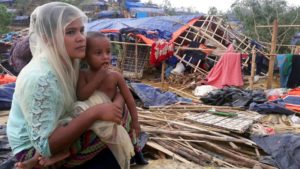Melbourne Rohingya community launches aid effort
 Melbourne’s Rohingya community is rallying to send clothing and money to their kinfolk who have been forced to flee their homes in the face of a brutal crackdown by the Burmese military.
Melbourne’s Rohingya community is rallying to send clothing and money to their kinfolk who have been forced to flee their homes in the face of a brutal crackdown by the Burmese military.
A community action group has been formed and there are plans to send a container load of clothing to Cox’s Bazaar, in Bangladesh, where around 600,000 Rohingya have taken refuge over the past two months.
Many of the local Rohingya have lost family and friends in the violence and many more fear for their loved ones living in desperate conditions.
Melbourne Rohingya community leader Majid Abdul said his community had held meetings to discuss ways of supporting the displaced Rohingya in Bangladesh.
“We are trying to organise some clothing to send and see how else we can help,” Mr Abdul said.
“Many people are in bad and desperate situations with not enough food and medicine. Many of them left with just the clothes there were wearing with the military came,” he said.
Mr Abdul said he initially had fears for his own family whose village was attacked.
“When the military moved in and my village was attacked, I Iost contact with my family,” he said.
“They ran into the jungle and hid from the soldiers for two weeks. They said ‘it was not safe in the village and we had to hide’,” Mr Abdul said.
“My mother, sister and brother fled but a lot of my friends were killed.
“My family’s farm is now controlled by the military and they are growing the rice for themselves,” he said.
Mr Abdul said his family had made it to safety and were in Cox’s Bazaar, across the border in Bangladesh.
“I’ve spoken to them there by phone and I’m happy and relieved they are safe. But they are living in bad conditions in a small shelter,” he said.
But Mr Majid said some members of Melbourne’s Rohingya community had lost family members.
“Some members of our community have lost their whole families and are under stress so we are trying to support them also. And there’s still people being killed so we are trying to work out other ways to help,” he said.
The Government of Bangladesh, local charities and volunteers, the UN and NGOs are working in overdrive to provide assistance, the statement said.
“But much more is urgently needed. The efforts must be scaled up and expanded to receive and protect refugees and ensure they are provided with basic shelter and acceptable living conditions,” said UNHCR Commissioner Filippo Grandi.
“Every day more vulnerable people arrive with very little – if anything – and settle either in overcrowded existing camps or extremely congested makeshift sites,” Mr Grandi said.
He said the refugees were fully dependent on humanitarian assistance for food, water, health and other essential needs adding that basic services were under severe strain.
“In some sites, there is no access to potable water, and sanitation facilities are absent, raising health risks for both the refugees and the communities hosting them,” Mr Grandi said.
The UN has praised Bangladesh for keeping its borders open, offering safety and shelter to fleeing families.
But news of an agreement between Bangladesh and Burma that would see Rohingya people return home to their villages has raised the suspicions of local Rohingya.
“After everything, we just cannot trust the Burmese government,” Mr Abdul said.
Laurie Nowell
AMES Australia Senior Journalist












